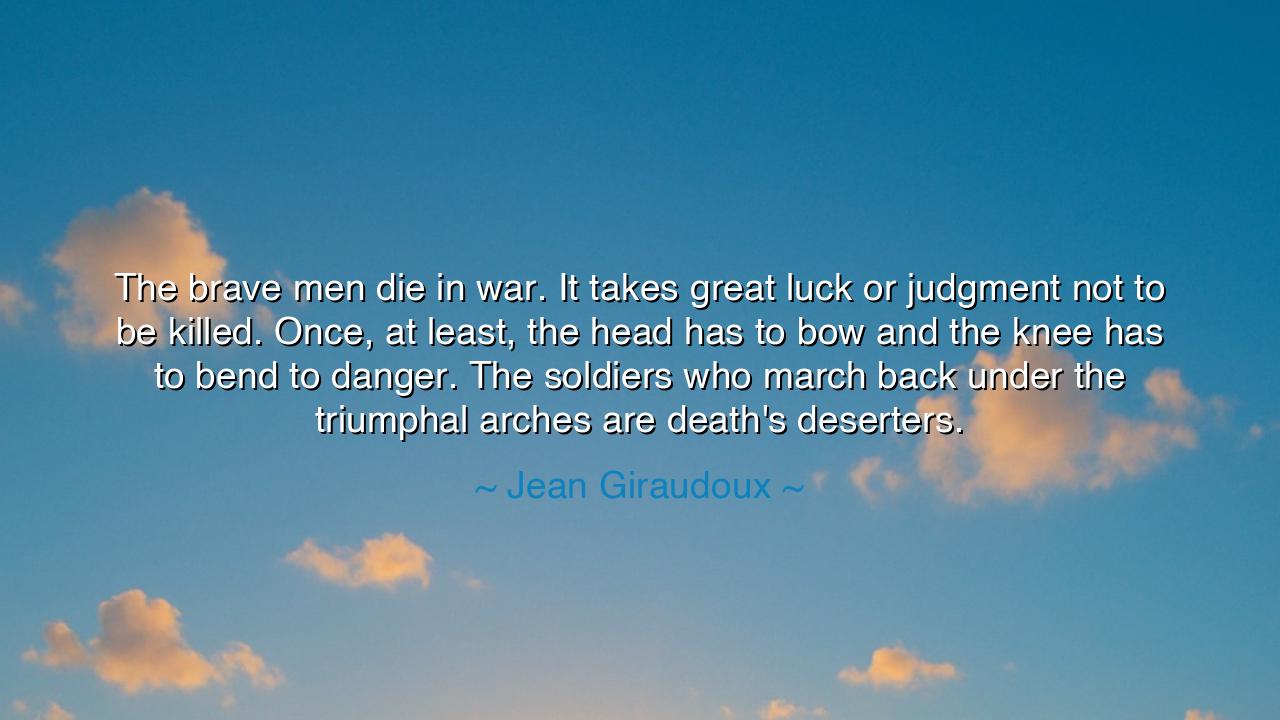
The brave men die in war. It takes great luck or judgment not to
The brave men die in war. It takes great luck or judgment not to be killed. Once, at least, the head has to bow and the knee has to bend to danger. The soldiers who march back under the triumphal arches are death's deserters.






“The brave men die in war. It takes great luck or judgment not to be killed. Once, at least, the head has to bow and the knee has to bend to danger. The soldiers who march back under the triumphal arches are death’s deserters.” Thus spoke Jean Giraudoux, the French dramatist and diplomat, whose words pierce the heart with their quiet sorrow and timeless wisdom. He was a man who had seen the fever of patriotism and the horror of war, who understood both the glory that nations proclaim and the grief that soldiers endure. In this single passage, he lifts the veil from the pageantry of victory and reveals the truth of mortality — that war spares no one, that courage does not guarantee survival, and that the living, though honored, march forever in the shadow of the dead.
Giraudoux lived through the First World War, that cataclysm which scarred the soul of Europe. As a French soldier and later a writer, he watched a generation vanish into the mud of the trenches — poets, farmers, lovers, sons. From that abyss arose his vision of war not as triumph, but as tragedy. When he writes that “the brave men die in war,” he does not mean that the cowardly are spared; he means that courage often walks hand in hand with doom. The brave go first into the fire, not because they wish to die, but because they cannot do otherwise. Valor, in its purest form, is the willingness to face death — and in that willingness lies both nobility and destruction.
“It takes great luck or judgment not to be killed.” Here, Giraudoux speaks with the candor of one who has seen the randomness of the battlefield. Death in war is not always just or selective. It does not measure courage or virtue; it strikes by chance — a bullet, a shell, a moment’s misstep. Thus he reminds us that survival is not always earned, but often granted by fate. The returning soldier may wear medals, but in his heart he knows how many of his comrades were braver, purer, better — and yet fell. This humility, born of grief, is what gives his words their quiet sanctity.
When Giraudoux says that “once, at least, the head has to bow and the knee has to bend to danger,” he speaks not only of soldiers, but of all humanity. There comes a moment in every life when pride must yield to fear, when even the strongest man must acknowledge his frailty before fate. This bowing is not cowardice — it is acceptance, the ancient gesture of mortals before the powers they cannot control. The true hero is not the one who feels no fear, but the one who moves forward despite it, knowing that his life hangs on the thread of chance.
And then comes the bitterest truth of all: “The soldiers who march back under the triumphal arches are death’s deserters.” The image is haunting. The arch — symbol of victory, of empire, of pride — stands as the world’s applause for survival. Yet Giraudoux calls those who pass beneath it not conquerors, but deserters of death. For they are not untouched by war; they are its remnants, the ones whom death overlooked. Beneath their laurels lies guilt and sorrow, the burden of the living who carry the memory of the fallen. The world may celebrate them, but in their hearts, they know they have escaped what others could not. The arch, to them, is not a gate of glory, but a silent tomb of memory.
History itself offers many such arches and many such men. Think of Odysseus, who returned from Troy not in triumph, but in exhaustion, haunted by the ghosts of his comrades. The bards sing of his cunning and endurance, but he himself knew the cost of survival — that the price of coming home is the memory of those who did not. So too did the soldiers of every age — from the Roman legions to the trenches of Verdun — march home beneath the cheers of the living, carrying within them the grief of the dead. Each was a deserter of death, bound not by glory, but by remembrance.
Lesson: Giraudoux’s words are not meant to diminish courage, but to humanize it. They teach us that bravery is not measured by survival or victory, but by the willingness to face the inevitable with dignity. They remind us to honor not only the fallen, but the living who carry the invisible scars of survival. Let us not glorify war, but rather seek to understand its terrible cost — the broken hearts, the quiet souls, the bowed heads of those who returned.
So, my child, when you see the triumphal arches of your own age — the parades, the medals, the victories — remember that beneath every celebration lies the shadow of sacrifice. Walk humbly, speak gently of the brave, and never let your heart grow callous to death’s toll. For the day you cease to feel sorrow for the fallen is the day you forget what it means to be human.






AAdministratorAdministrator
Welcome, honored guests. Please leave a comment, we will respond soon